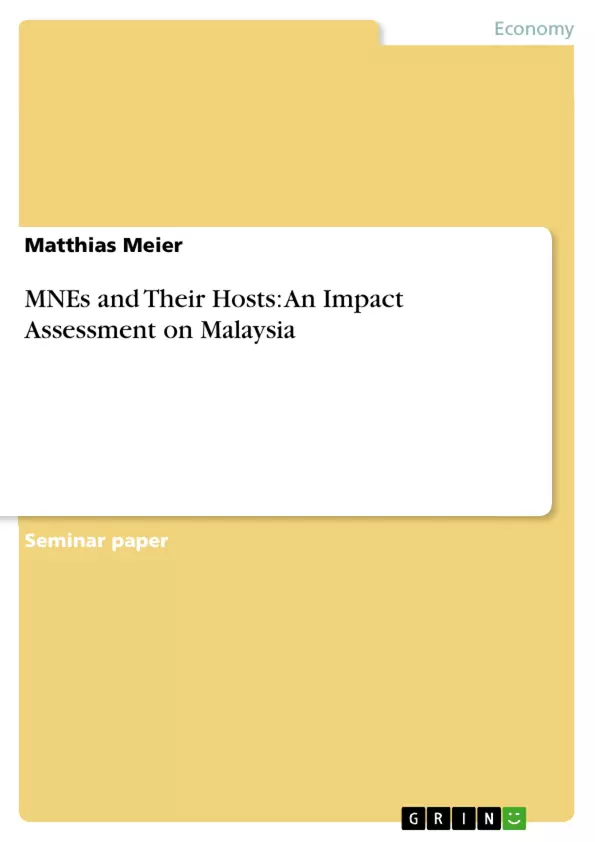Strategically positioned in the heart of Southeast Asia, Malaysia is one of the world’s most attractive locations for FDI. Since independence in 1957, Malaysia has moved from an agriculturally based economy to a more diversified and export orientated one. In 1963 the federation was enlarged by the accession of Singapore, which left in 1965. Since then, Malaysia has enjoyed a climate of political stability which was conducive to high economic growth based on industrialisation and stimulated by foreign investment. (China-Asean Business Net 2006)
The National Development Policy provides a framework towards the new vision 2020 plan of the Prime Minister, Dr. Mahathir, which symbolises "the way forward" policy towards a "developed" nation in 2020. (ibid) This can only be achieved by enduring high FDI which contributes positively to national wealth.
This report provides a descriptive base of FDI in Malaysia in Chapter 2. Chapter 3 analyses the impacts of FDI in theoretical terms, whereas Chapter 4 deals with empirical impacts on Malaysia. Chapter 5 suggests policy implications based on the findings of the previous chapters.
Inhaltsverzeichnis (Table of Contents)
- 1 Introduction
- 2 Background of FDI in Malaysia
- 3 FDI Impact - Theoretical Analysis
- 3.1 Balance of Payment Effects
- 3.2 Employment Effects
- 3.3 Technological Effects
- 3.4 Sovereignty
- 4 FDI Impact - Empirical Analysis
- 4.1 Balance of Payment Effects
- 4.2 Employment Effects
- 4.3 Technological Effects
- 4.4 Sovereignty
- 5 Policy Implications
- 6 Conclusion
Zielsetzung und Themenschwerpunkte (Objectives and Key Themes)
This report aims to provide a comprehensive analysis of Foreign Direct Investment (FDI) in Malaysia, examining its historical background, theoretical impacts, empirical effects, and policy implications. It explores the role of FDI in Malaysia's economic development and its contribution to the country's transition from an agricultural to a more diversified, export-oriented economy.
- The impact of FDI on Malaysia's economic growth and development.
- The theoretical and empirical effects of FDI on the balance of payments, employment, technology transfer, and national sovereignty.
- The role of FDI in promoting industrialization and diversification in Malaysia.
- The policy implications of FDI for promoting economic growth, competitiveness, and sustainability.
- The dependence of Malaysia on foreign capital and its significance in attracting FDI.
Zusammenfassung der Kapitel (Chapter Summaries)
Chapter 2 provides an overview of the background of FDI in Malaysia, highlighting its crucial role in the country's economic development over the past three decades. It focuses on the significant contribution of FDI to Malaysia's rapid economic growth and the country's transition to a more diversified, export-oriented economy. Chapter 3 delves into the theoretical impacts of FDI, examining its effects on the balance of payments, employment, technological transfer, and national sovereignty. This chapter analyzes the theoretical framework that explains the benefits and challenges associated with FDI. Chapter 4 explores the empirical impacts of FDI in Malaysia, providing data and analysis on the effects of FDI on the balance of payments, employment, technology transfer, and national sovereignty. This chapter provides evidence-based insights into the actual effects of FDI on the Malaysian economy.
Schlüsselwörter (Keywords)
Foreign Direct Investment (FDI), Malaysia, economic growth, balance of payments, employment, technology transfer, national sovereignty, industrialization, diversification, export orientation, Gross Domestic Product (GDP), Gross Fixed Capital Formation (GFCF), Multinational Enterprises (MNEs).
Frequently Asked Questions
How has Malaysia's economy evolved since 1957?
Malaysia has transitioned from an agriculturally based economy to a highly diversified, export-oriented industrial nation, largely driven by foreign investment.
What is "Vision 2020" in Malaysia?
Vision 2020 was a plan introduced by Dr. Mahathir Mohamad, aiming for Malaysia to become a fully developed nation by the year 2020 through high economic growth and FDI.
What are the main impacts of FDI on Malaysia?
The report analyzes effects on the balance of payments, employment creation, technology transfer, and national sovereignty.
Does FDI affect Malaysia's national sovereignty?
The paper examines the theoretical and empirical concerns that heavy dependence on Multinational Enterprises (MNEs) might influence a host country's political and economic autonomy.
How important is FDI for Malaysia's wealth?
FDI is considered a vital source of national wealth and is essential for maintaining the country's competitiveness in the Southeast Asian region.
- Arbeit zitieren
- Matthias Meier (Autor:in), 2006, MNEs and Their Hosts: An Impact Assessment on Malaysia, München, GRIN Verlag, https://www.hausarbeiten.de/document/57533


